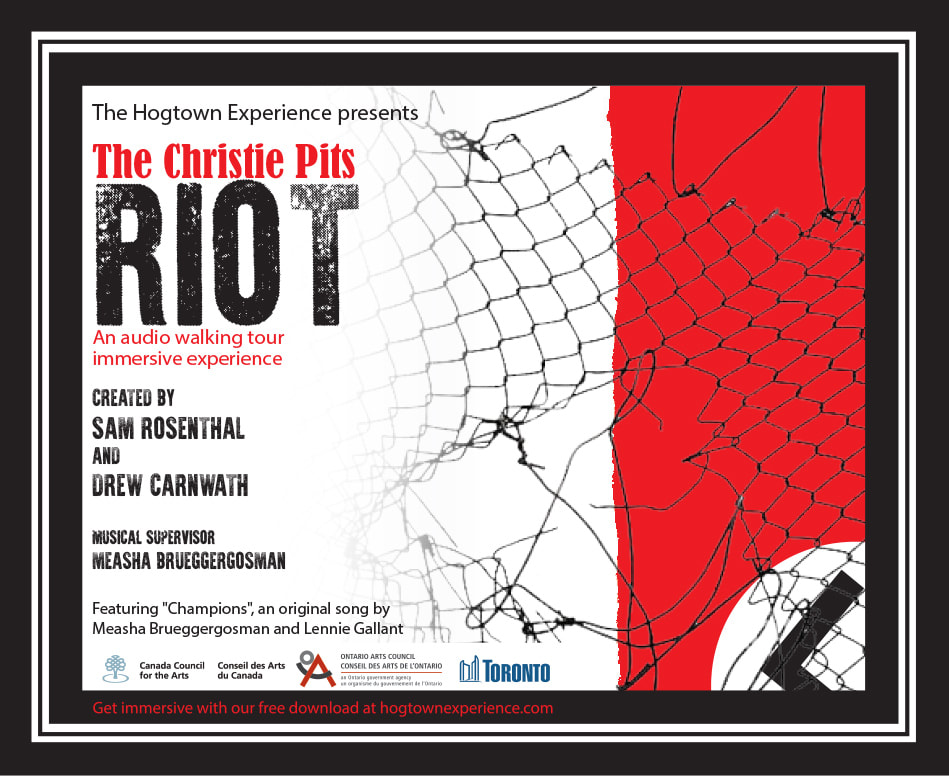You can relive Toronto’s only race riot by taking an audio tour of the neighbourhood where Jews and Italians fought Nazi supporters with their fists, bricks, lead pipes, baseball bats and broken glass from dusk until dawn on Aug. 16, 1933.
The free audio tour The Christie Pits Riot, developed by the immersive theatre company The Hogtown Collective, is a dramatization based on the riot. The walking tour guides us to various locations in the Bloor Street West area as we follow the fictional 12-year-old Joey Rosenbaum during the 24 hours leading up to the riot and then witness it in Christie Pits Park through his eyes.
The riot began at a semifinal baseball game between the mostly Jewish Harbord Playground team and St. Peter’s, sponsored by the Catholic church at Bloor and Bathurst streets. It was sparked when local Nazi supporters, known as the Pit Gang, unfurled a bedsheet with a black swastika painted on it. The riot spread to the surrounding streets and people from more than 10 blocks away joined in the fray. Italians, who also faced discrimination in the city, fought with the Jews.
Toronto was rife with antisemitism at the time and it’s reflected in the lives of Joey’s family—including his father, a druggist, and his older brother, Ze’ev, who’s involved in the violent confrontations between members of a swastika club and Jews in a beach park in the city’s east end. During the 24 hours leading to the riot, Joey’s awareness of the antisemitism around him grows.
The audio play was co-created by Samuel Rosenthal and Drew Carnwath, with Rosenthal writing and narrating while Carnwath contributed much of the research to the project
The story is loosely based on some real Rosenthal family history. Sam Rosenthal’s grandfather owned a drugstore at Bloor Street and Manning Avenue, as does Joey Rosenbaum’s dad. Like Joey’s father, Rosenthal’s grandfather wanted to become a doctor, but with the rampant antisemitism of the time he was unable to achieve his dream. “There was a quota on how many Jewish students could attend the University of Toronto, so he became a druggist,” Rosenthal said.
He got the idea for the audio drama from his father, Joseph, who was born a couple of years after the riot. Rosenthal says he was a “little ashamed” to tell his father he didn’t know as much as he should about the riot.
His father shared stories with him about how difficult it was growing up Jewish in Toronto in the late 1930s and early ‘40s. “He can remember everything from that time as if it was yesterday,” Rosenthal said. “To me, there was an emotional connection. I thought there must be others, like my father, who would love to hear this story told.”
Rosenthal and Carnwath chose to tell the story through Joey, rather than his older brother, because they wanted a compassionate viewpoint.
“Our idea was to tell the story through a 12-year-old boy’s eyes and ask questions like ‘why do they hate us,’ questions from out of the mouths of babes,” Rosenthal said. “If it comes from someone like Ze’ev, who’s going to the beaches where Jews are not welcome, we’re going to get a very different take. It’s not going to be as compassionate. I would have written it in a more angry way. We wanted to write it in a more innocent way.”
Rosenthal said we have to talk about antisemitism in a way that younger people can identify with, while older people can feel their stories are heard and validated.
“My father feels like many people don’t care anymore, but he hopes the audio drama will get people talking about it. And to put a hopeful spin on it, it’s important to see how all of these people, not just Jews—Italians, Portuguese and other immigrants—came together and stood up for what they believed was their right to exist in Toronto with other people.”
The audio drama is compelling, thanks to the engrossing script and the expressive voices of the cast who bring the characters to life. Playing Joey Rosenbaum is Judah Davidson, a Grade 7 student with several TV and stage credits who gives a strong and convincing performance. Canadian opera star Measha Brueggergosman and singer-songwriter Lenny Gallant co-wrote the play’s theme song, “Champions.”
If you’re unable to do the walking part of the tour, you can enjoy it from the comfort of your couch—or walking anywhere.
The four episodes can be found here. Watch the “Champions” theme song performed live below:









